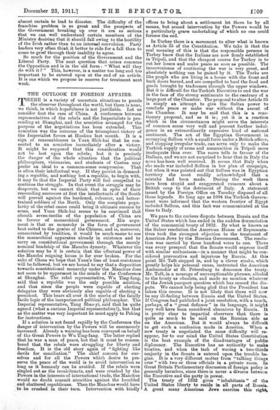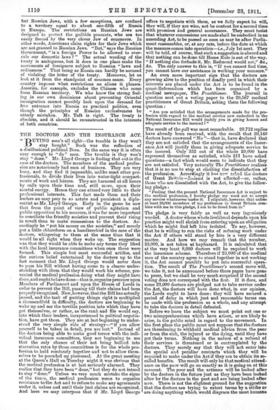THE OUTLOOK IN FOREIGN AFFAIRS. T HERE is a variety of
uncertain situations to puzzle the observer throughout the world, but there is none, we think, in which hopefulness is not justifiable. Let us -consider first the case of China. A conference between representatives of the rebels and the Imperialists is pro- ceeding at Shanghai, and the armistice arranged for the purpose of the negotiations has been extended. This armistice was the outcome of the triumphant victory of the Imperialist forces at Hankau last month. It is a sign of reasonableness in Yuan Shih-kai that he con- sented to an armistice immediately after a victory. It might be supposed that this consideration would not be lost upon the rebels ; but it is precisely the danger of the whole situation that the political philosophers, visionaries, and students of Canton may an ideal to a common-sense compromise. That is often their intellectual way. If they persist in demand- ing a republic, and nothing-but a republic, to begin with, it may be that the Imperial Party will feel compelled to continue the struggle. In that event the struggle may be desperate, but we cannot think that in spite of their 'resounding successes at first the intellectuals of the South will prevail against the hardened, robuster, and better- trained soldiers of the North. Only the complete popu- larity of the rebel cause could bring it ultimate success by arms, and Yuan Shih-kai seems to be convinced that abouth seven-tenths of the population of China are in favour of monarchical government. His argu- ment is that as monarchy is the form of government best suited to the genius of the Chinese, and is, moreover, consecrated by tradition, it would be much easier to use the monarchical apparatus already in existence and to carry on constitutional government through the merely nominal headship of the Manchu dynasty. Whatever the solution may be it is certain that the effectual power of the Manchu reigning house is for ever broken. For the sake of China we hope that Yuan's line of least resistance will be followed, but we are bound to say that a disposition towards constitutional monarchy under the Manchus does not seem to be uppermost in the minds of the Conference at Shanghai. The rebel representative, Wu Ting-fang, said that a republic was the only possible solution, and that since the people were capable of electing delegates they were obviously also capable of electing a president. This bears all over it the marks of the fatally facile logic of the inexperienced political philosopher. The Imperial representative, Tang Shao-yi, said that he quite agreed (what a curious Imperial representative !), but that as the matter was very important he must apply to Peking for instructions.
If a solution is not found rapidly by the Conference the danger of intervention by the Powers will be enormously increased. Already a warning has been conveyed on behalf of the Great Powers to Wu Ting-fang. The latter replied that he was a man of peace, but that it must be remem- bered that the rebels were struggling for liberty and freedom. It is the old story again of " fighting like devils for conciliation." The chief concern for our- selves and for all the Powers which desire to pre- serve the peace of the world is to avoid intervention so long as it humanly can be avoided. If the rebels were singled out as the recalcitrants, and were crushed by the Powers in the interests of international trade, the Manchus would no doubt commit atrocities against the humbled and shattered republicans. Then the Manchus would have to be crushed in their turn. Intervention with kindly offices to bring about a settlement let there be by all means, but armed intervention by the Powers would be a particularly grave undertaking of which no one could foresee the end.
In Turkey there is a movement to alter what is known as Article 35 of the Constitution. We take it that the real meaning of this is that the responsible persons in Turkey know that the Italians are now firmly established in Tripoli, and that the cheapest course for Turkey is to cut her losses and make peace as soon as possible. The inconvenience of continuing the war is very great, and absolutely nothing can be gained by it. The Turks are like people who are living in a house with the front and back doors barred, and are compelled to haul the food and goods brought by tradesmen through the upper windows. But it is difficult for the Turkish Executive to end the war in the face of the strong sentiments to the contrary of a large part of the Chamber. The proposal to alter Article 35 is simply an attempt to give the Sultan power to conclude peace or make war without the assent of the Chamber. It may be said that this is a reac- tionary proposal, and so it is ; yet it is a reaction which in the circumstances might serve the interests of common sense very well and prevent further indul- gence in an extraordinarily expensive kind of national sentiment. The act of the Egyptian Government in occupying Sollum with a small force under a British officer, and stopping irregular trade, can serve only to make the Turkish supply of arms and ammunition in Tripoli more inadequate than ever. The move tells in favour of the Italians, and we are not surprised to hear that in Italy the news has been well received. It seems that Italy when she made war included Sollum in her plan of campaign, but when it was pointed out that Sollum was in Egyptian territory she most readily- acknowledged that a mistake had been made. During the week there have been stupid and exaggerated rumours about a British coup to the detriment of Italy. A statement issued by the Foreign Office on Tuesday disposed of all these legends. So long ago as 1904 the Turkish Govern- ment were informed that the western frontier of Egypt included Sollum, and this fact was communicated. at the time to Italy.
We pass to the curious dispute between Russia and the United States which has ended in the sudden denunciation of the commercial treaty of 1832. By what is known as the Sulzer resolution the American House of Representa- tives took the strongest objection to the treatment of American. Jews by the Russian Government. The resolu- tion was carried by three hundred. votes to one. There was every prospect that the Senate would express itself with similar enthusiasm—in a manner that might be con- sidered provocative and injurious by Russia. At this point Mr. Taft stepped in, and by a clever stroke, which i greatly helps his personal cause, instructed the American Ambassador at St. Petersburg to denounce the treaty. Mr. Taft, in a message of unexceptionable phrases, alluded to the treaty as obsolete, and made no mention whatever of the Jewish passport question which has caused the dis- pute. We cannot help being glad that the President has taken this course. It is not likely that there will now be any ill-feeling between Russia and the United States. If Congress had published a joint resolution, with a touch, perhaps, of a " great defiance " in its language, it might very well have been considered obnoxious by Russia. It is pretty clear to impartial observers that there is quite as much to be said on the Russian side as on the American. But it would always be difficult to get such a confession made in America. When a new treaty is negotiated the same difficulty will re- appear, for to our mind. the United States Constitution is the best example of the disadvantages of public diplomacy. The Executive has no authority to make treaties, and when the task of wooing a two-thirds majority in the Senate is entered upon the trouble be- gins. It is a very different matter from "talking things over " with two or three officials in a private room. In Great Britain Parliamentary discussion of foreign policy is generally harmless, since there is never a divorce between the Executive and the party in power.
The treaty of 1832 gives " inhabitants " of the United States liberty to reside in all parts of Russia. A great many American Jews exercise this right, but Russian Jews, with a few exceptions, are confined to a territory equal to about one-fifth of Russia in Europe. The restrictions on Russian Jews are designed to protect the gullible peasants, who are too easily-fleeced by the very clever Jew of commerce. In other words, Americans claim rights for their Jews which are not granted to Russian Jews. "But," says the Russian Government, " is a foreign Power to be allowed to over- rule our domestic laws ? " The actual wording of the treaty is ambiguous, but it does in one place make the movements of foreigners subject to Russian " laws and ordinances." That being so Russia can hardly be accused of violating the letter of the treaty. Moreover, let us look at it from the standpoint of common sense. Every country imposes what restrictions on aliens it pleases. America, for example, excludes the Chinese who come from Russian territory. We who know the strong feel- ing in our own dominions about preventing Oriental immigration cannot possibly look upon the demand for free entrance into Russia as practical politics, even though the principles of Russian exclusiveness be utterly mistaken. Mr. Taft is right. The treaty is obsolete, and it should be reconstructed in the interests of both countries.



































 Previous page
Previous page